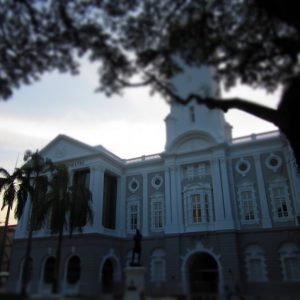Commemorating Stamford Raffles and the ‘Founding’ of Singapore
August 10, 2020

In 1819, Sir Thomas Stamford Raffles (1781-1826) sailed to Malacca to secure British presence in the Riau region, and later settled on a post at the southern tip of the Malay Peninsula – what would eventually become the island of Singapore.
Though Raffles has since been recognized as the founder of modern Singapore in school history textbooks and the public psyche, this changed with the 2019 Bicentennial. Associate Professor Huang Jianli’s (NUS Department of History) article ‘Stamford Raffles and the ‘Founding’ of Singapore: The Politics of Commemoration and Dilemmas of History’ (Journal of the Malaysian Branch of the Royal Asiatic Society, 2018), sheds light on the recent contentions and politics that have emerged behind the way a young nation state commemorates its history.
As A/P Huang identifies, one of the main reasons behind Raffles’ celebration as a historical hero is due to the party-state’s embrace of the British colonial legacy in post-independence governance and the lavish celebration of PAP rule. In response, the Bicentennial organization consciously avoided a top-down commemoration by choosing to involve schools, businesses, and religious organizations. Importantly, A/P Huang highlights the Bicentennial’s embrace of the nation’s 700-year timeline over the 200-year one, choosing thus to recognize Singapore’s existence as a bustling local settlement even before the imposition of the British Empire – a departure from the misconception of Singapore as a ‘sleepy fishing village’. In doing so, A/P Huang suggests that the Bicentennial avoided perpetuating the centrality of Raffles’ heroic landing to Singapore’s history.
In recent years, scholarship has also shifted against Raffles. Many organizations and important public academics and figures like Professor Tommy Koh or author Nadia Wright have challenged these dominant portrayals of the nation’s narrative by attempting to elevate other important figures (for example, William Farquhar), who they believe played a more vital role in developing Singapore.
Amidst the contentions over Singapore’s history, however, A/P Huang states that one thing remains clear: the nation is at a crossroads in determining the future direction of its national history.
Read the full article here.
